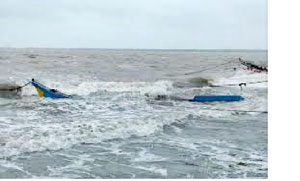News
India’s lost fisherfolk
View(s):NEW DELHI – Last month, a devastating cyclone swept the southern tip of India, causing immense damage to parts of Kerala, Tamil Nadu, and Lakshadweep. Most victims of the oddly named Cyclone Ockhi were fishermen from the districts of Thiruvananthapuram (in Kerala) and Kanyakumari (in Tamil Nadu) who, owing to the lack of a timely cyclone alert, had ventured out to sea, unaware of the danger.
Their tragedy highlights the extreme vulnerability of India’s poor coastal communities to the vagaries of nature.

Cyclone Ockhi left a trail of destruction. Pic The Hindu
So far, Ockhi is known to have taken 245 lives, with 661 still missing, many of whom were lost at sea and are unlikely ever to be found. Moreover, nearly 3,500 homes were damaged in Kerala alone, with 221 completely destroyed. The storm was so powerful that its winds even shook parts of Maharashtra and Gujarat.
For me, Ockhi was no distant headline. As the Member of Parliament representing Thiruvananthapuram, I witnessed firsthand the disaster and its terrible toll on some of India’s poorest and most marginalised people. I have visited the homes of the bereaved, and lit incense sticks and candles at makeshift shrines. As I mourned with these beleaguered communities, trying to share their pain and grief, I vowed to do all I can to secure help for them.
So far, the national and state governments have focused largely – and quite appropriately – on providing immediate relief to the affected families. But, to protect India’s coastal communities, policymakers must urgently undertake a comprehensive review of the reasons why the cyclone was so devastating, and how the impact of a future disaster could be mitigated.
No cyclone alert was issued by the India Meteorological Department until Ockhi had already struck, and the initial rescue efforts were grossly inadequate to the scale of the challenge. By the time the coast guard and the Indian navy had brought enough ships and planes to the affected area, a full 24 hours had passed since Ockhi capsized numerous fishing boats. It was too late to rescue those who had been clinging to the wreckage. Official search and rescue efforts saved only a handful of lives.
Meanwhile, fisherfolk – that is, the friends and relatives of those who had ventured out to the wrong place at the wrong time – clamoured to join those efforts. After all, they knew where their colleagues and loved ones were likely to be. When they were finally allowed on board the rescue vessels, they guided officials to areas where floating bodies had been spotted. But many of those bodies were not picked up, because the naval ships had no facilities to accommodate corpses, and the defence ministry was still “in the process of procuring” mobile mortuaries.
The fisherfolk are not alone in criticizing the ineffectiveness of the rescue efforts. India needs a detailed official inquiry into the various elements of disaster prediction, management, and relief, guided by the experience of Ockhi. Would better institutional arrangements, such as closer cooperation with international typhoon monitoring bodies, have ensured a timely forecast? How can relief operations and overall emergency management be improved? Should search-and-rescue aircraft and vessels be stationed in the vicinity?
One way to strengthen India’s disaster-response capabilities would be to create the marine equivalent of our territorial army, training selected fisherfolk in how to carry out search-and-rescue operations. Such training, together with students’ affinity for their fellow fishermen and their expertise in braving turbulent seas, would make for a highly effective reserve unit, to be deployed when disaster strikes.
Another issue that risks being overlooked by the focus on urgent and immediate financial relief is coastal communities’ long-term economic needs. To be sure, immediate relief is vital: Ockhi has completely shut down everyday activities in some coastal areas, causing severe economic (not to mention emotional) distress for the region’s poor fishing communities.
But perhaps it is time to consider whether it is fair to condemn these communities to long-term dependence on fishing. Just as India’s agriculture cannot sustain all the farmers trying to live off the land, our over-fished seas cannot possibly sustain all of our fishermen. With their traditional fishing grounds unable to deliver a decent living, they risk their lives to venture further and further from shore. Some of my constituents have been arrested as far afield as the British Indian Ocean territory of Diego Garcia, which they reached in their hunt for unexploited fishing grounds.
As it stands, members of India’s fishing communities do not have any alternative skills that would enable them to pursue other occupations. Offering them and their children skills development and vocational training courses in other fields would transform their lives for the better.
Ockhi has starkly demonstrated that all is not well for India’s fisherfolk. To prevent the next natural disaster from causing so much damage and inflicting so much pain, we must take action now to improve prediction and response, and strengthen the resilience of our most vulnerable citizens.
(The writer is a former UN under-secretary-general and former Indian Minister of State for External Affairs and Minister of State for Human Resource Development and is currently Chairman of the Parliamentary Standing Committee on External Affairs and an MP for the Indian National Congress.)
Copyright: Project Syndicate, 2018. www.project-syndicate.org

